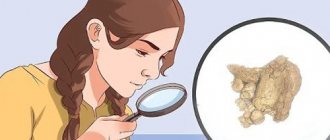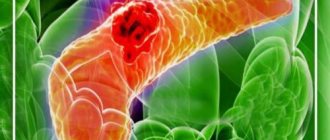ACHLORHYDRIA
(
achlorhydria
; Greek a- negative + chloros green + hydör water) - the absence of free hydrochloric acid in the gastric contents. The term “anaciditas” is often used clinically as a synonym for achlorhydria. In reality, this is not entirely correct, since gastric secretions are always sour.
Most modern authors share the idea of I.P. Pavlov that gastric juice always has a constant concentration of hydrochloric acid: 160 meq/l [J. Horeysi, 1967; L. Demling] or 143 mEq/l [A. Lambling et al., 1960].
Fluctuations in the acidity of gastric contents both on an empty stomach and after test stimuli are determined by the ratio of two main components: acidic and alkaline. The acidic component of secretion is a product of the activity of parietal cells, which secrete hydrochloric acid. The alkaline component is a product of the mucous glands of the stomach and is mucus in a colloidal suspension of bicarbonates and neutral chlorides. When the acidic component predominates, free hydrochloric acid is detected; in the opposite case, a deficiency of hydrochloric acid develops. Not only the free hydrochloric acid curve, but also the possible deficiency curve is of diagnostic importance.
What is achlorhydria
Achlorhydria is a disease that belongs to the category of gastroenterological diseases, in which there is either no hydrochloric acid in the stomach or its concentration is too low. At the initial stage, the disease is practically asymptomatic. For this reason, diagnosis is often made too late and the disease is detected already at a time when complications develop.
Achlorhydria occurs in both women and men. But in most cases it develops at a more mature age - after 50 years. The peak incidence occurs in people 70 years of age and older.
But achlorhydria usually does not appear unexpectedly; it develops against the background of other diseases of the gastrointestinal tract or due to the activity of dangerous microorganisms - Helicobacter pylori.
If therapy is started before the first symptoms of the disease appear, the prognosis for the patient will be favorable. In the later stages, achlorhydria is practically incurable; in addition, it can cause serious complications, including cancer.
The disease can be diagnosed using laboratory and instrumental research methods. The basis of treatment is symptomatic therapy, carried out on an individual basis.
Achlorhydria is divided into the following types:
- Histamine-resistant - does not respond to stimulation from neurohumoral regulation when it is normal. Stomach acidity is reduced.
- Functional - when it stops the production of histamine and due to this, the functioning of the stomach is disrupted. Gastric acidity is normal or increased.
- Organic – stomach cells are affected. Gastric juice is not produced.
- Idiopathic - secretory cells are absent due to a congenital anomaly.
Symptoms of achlorhydria
For a disease such as gastric achlorhydria, the symptoms go unnoticed at first, which makes it difficult to detect it in a timely manner. The first signs appear gradually. Occasionally, the patient may feel discomfort after eating protein foods.
Stopping the production of hydrochloric acid may increase the risk of developing iron deficiency anemia. Without stomach acid, the body will have difficulty absorbing iron. Other vitamins and minerals, such as calcium, folic acid, vitamin C and vitamin D, must also be absorbed into the digestive tract through the work of stomach acid.
Other symptoms of achlorhydria:
- bloating;
- stomach upset;
- nausea;
- acid reflux;
- digestive problems;
- diarrhea;
- weak, brittle nails;
- hair loss;
- undigested food in the stool.
Development of malabsorption
With complications of the disease, malabsorption may occur (cessation of absorption of nutrients by the small intestine). Lack of nutrients in the body can lead to a variety of problems, including the development of neurological diseases such as:
- weakness of arms and legs;
- tingling or numbness in the fingers and toes;
- memory loss;
- changes in vision;
- hallucinations.
Sometimes the doctor receives complaints about an enlarged abdomen and increased salivation. Symptoms increase gradually as the stomach tissues undergo changes due to the disease.
Functions of hydrochloric acid in the stomach
Gastric juice is necessary for every person for the normal functioning of the gastrointestinal tract. What function does hydrochloric acid perform in the stomach?
- Creates an acidic environment. This is important for the activation of enzymes that are secreted in the stomach.
- Creates conditions for the denaturation of protein molecules and promotes the beginning of their breakdown.
- Destroys bacteria.
- Performs an evacuation function by opening and closing the pyloric sphincter.
- It affects the secretion of enzymes by glandular cells of the gastric epithelium.
Signs and symptoms
Regardless of the cause, achlorhydria can result from the known complications of bacterial overgrowth and intestinal metaplasia, and symptoms often correspond to these diseases:
- gastroesophageal reflux disease;
- abdominal discomfort;
- early saturation;
- weight loss;
- diarrhea;
- constipation;
- bloating;
- anemia;
- stomach infection;
- malabsorption of food;
- stomach cancer.
Because an acidic pH promotes iron absorption, patients with achlorhydria often develop iron deficiency anemia. The acidic environment of the stomach promotes the conversion of pepsinogen to pepsin, which is very important for the digestion of protein into smaller components such as complex protein into simple peptides and amino acids inside the stomach, which are later absorbed in the gastrointestinal tract.
Bacterial overgrowth and B12 deficiency (pernicious anemia) can cause micronutrient deficiencies that lead to a variety of clinical neurological manifestations, including visual changes, paresthesia, ataxia, limb weakness, gait disturbance, memory defects, hallucinations, and personality and mood changes.
There is an increased risk of contracting certain infections, such as Vibrio vulnificus (usually from seafood). Even without bacterial overgrowth, low stomach acid levels (high pH) can lead to nutritional deficiencies due to decreased absorption of essential electrolytes (magnesium, zinc, etc.) and vitamins (including vitamin C, vitamin K, and vitamin B complex ). Such deficiencies can cause a wide range of pathologies, from fairly benign neuromuscular problems to life-threatening diseases.
Why is acidity disrupted?
Acidity may be impaired due to a malfunction of any organ. This can occur with the following diseases:
- gastritis in acute or chronic stage;
- the presence of Helicobacter bacteria in the body;
- stomach and duodenal ulcers;
- the presence of a hernia in the esophagus;
- reflux esophagitis;
- liver disease;
- intoxication or allergic reactions;
- hormonal imbalances;
- cancerous tumors in the stomach or pancreas.
Only the main causes of achlorhydria are listed here.
Provoking factors
Hypersecretion of the stomach develops against the background of provoking factors:
- Errors in eating habits, such as eating on the go, chewing food quickly, overeating.
- Eating some junk food: fast food, fried and fatty foods, smoked meats, spices, adding hot seasonings to dishes. Patients with high acidity should not overuse citrus fruits, sour fruits and berries.
- Drinking alcohol, carbonated drinks, coffee and cocoa, smoking.
- Stressful situations and heredity.
- Autoimmune diseases such as diabetes.
- Harmful working conditions or low standard of living.
- Long-term use of certain medications: antidepressants, choleretic drugs, stimulants, etc.
Typically, information about the symptoms, causes of the disease, as well as treatment methods can be provided by specialists from the gastroenterology center or a therapist at the district clinic.
Causes of the disease
The reasons for the development of functional pathology can be:
- existing diseases (for example, diabetes);
- hormonal imbalances;
- eating disorders, low consumption culture;
- physical and mental stress;
- harmful working conditions or poor quality of life;
- weakened immunity (HIV, autoimmune diseases, pregnancy, colds);
- long-term or incorrect use of antidepressants, stimulants, choleretic drugs;
- passion for surfactants (including cigarettes and alcohol).
In addition to the above factors, organic dysfunction can be provoked by:
- advanced course of functional achylia;
- acute and chronic forms of gastritis;
- hepatitis and other liver diseases;
- inflammation of the pancreas;
- colitis;
- ulcer;
- bacterial and viral intestinal infections;
- oncology.
Violation of the activity of pepsin and hydrochloric acid in organic achylia is more common in people of mature age, while a functional type of disturbance is characteristic of the stomachs of young people.
Symptoms of gastric achylia
Achlorhydria is a disease that is difficult to recognize in the initial stages. At first there are practically no symptoms. But if the condition is provoked by gastritis, then the signs of the disease will become noticeable much earlier.
The main symptoms of the lack of hydrochloric acid in gastric juice are dyspeptic disorders. They appear as follows:
- diarrhea;
- nausea and heartburn;
- heaviness in the stomach and a feeling of satiety even after small doses of food;
- sour belching;
- lack of appetite;
- flatulence;
- abdominal pain;
- vomit.
The patient usually does not want to eat protein foods, but there is a craving for sour drinks and foods. Vomiting occurs due to disruption of the stomach. Due to a deficiency of acid in it and impaired motor function, the production of pancreatic secretion increases. As a result, undigested food soon enters the intestines, where putrefactive processes develop. The intestinal mucosa becomes inflamed and diarrhea develops. Liquid stool contains undigested pieces of food.
Forecast
Little is known about the prognosis of achlorhydria, although there have been reports of an increased risk of gastric cancer.
A 2007 review article noted that non-Helicobacter species can be cultured from achlorhydric (pH > 4.0) stomachs, whereas normal gastric pH allows only Helicobacter species to grow. Bacterial overgrowth can cause false-positive test results for H. pylori as a result of changes in pH due to urease activity.
Diagnostics
The presence of symptoms of hyperacidity may not indicate the presence of achlorhydria. Additional diagnostics are required to make a diagnosis.
- FGDS - this study involves swallowing a probe with a camera attached to the end. In this case, pathological foci in the stomach can be seen on the monitor screen.
- Determination of acidity level - this examination is carried out simultaneously with the previous one.
- Test for the detection of Helicobacter - it can be determined during FGDS, by donating blood or using a breath test.
Symptoms
In the first stages, this disease is asymptomatic, so it is detected extremely rarely and often by chance, during the diagnosis of completely other diseases or during a preventive examination.
As the disease worsens, the following will appear:
- the occurrence of pain in the epigastric region. The pain is often aching and moderate in nature;
- rapid satiety and a feeling of fullness in the stomach, despite eating a small amount of food;
- an increase in the size of the abdomen;
- belching air;
- increased salivation;
- nausea without gagging.
Which doctor should I contact?
If a person experiences unpleasant symptoms associated with digestion, they should visit a gastroenterologist. He may additionally go to other specialized specialists, such as a physiotherapist and nutritionist. To identify the cause of the disease, you will need the help of an immunologist, endocrinologist, nephrologist (if renal failure is present). Everything will depend on the presence of various symptoms.
Therapy is provided by gastroenterology centers. For example, in St. Petersburg:
- Medem is a multidisciplinary network of clinics. St. Marata, 6.
- Gastroenterological. st. Pionerskaya, 16.
- Medical. Sredny prospect V.O., no. 17.
- "Jerusalem". IN. 4th Line, 41A.
In Moscow:
- Scientific Center (TsNIIG) (Entuziastov Highway, 86).
- Medical center in Maryino, st. Lyublinskaya, 104.
Treatment of pathology
Achlorhydria is a disease that requires an integrated approach to treatment. In addition, it is very individual. Usually, gastric pathology acts only as a symptom of the underlying disease. Most often, the basis of any therapy in the absence of hydrochloric acid in the stomach is a special diet and certain nutritional rules:
- You need to eat up to 6 times a day. At the same time, portions should be small.
- The food must have a balance of nutrients.
- Meals should be prepared without adding oil.
- Food should be chewed well or porridges and liquid dishes should be prepared in advance.
- It is worth giving up smoking and alcohol.
Therapeutic measures are carried out by a gastroenterologist together with other specialists, mainly an endoscopist and a therapist.
After diagnosing the disease, treatment procedures are carried out individually, but according to the general scheme:
- a special diet is prescribed;
- physiotherapy procedures are carried out;
- necessary medications are prescribed;
- after exiting the acute phase, sanatorium-resort treatment is indicated.
A gastroenterologist in St. Petersburg or in any other city will primarily prescribe drug therapy and diet.
Diagnosis of the disease
Diagnostics allows you to differentiate the diagnosis, identify the cause, assess the damage caused to the gastrointestinal tract and prescribe appropriate treatment.
The diagnostic structure includes taking an anamnesis (which evaluates the course of the disease, the severity of symptoms, their duration), laboratory and instrumental studies.
The list of diagnostic methods is selected by the doctor individually. The following diagnostic procedures are commonly used:
- Analysis of stool for undigested food.
- A urine staining test that determines the presence of hydrochloric acid in the stomach. The patient is given a capsule with a dye to swallow, which is activated by interacting with the acid. The result is assessed by the color of the urine. The test was found to be insufficiently accurate. Its use is justified when other diagnostics are impossible.
- Measuring the pH environment of the stomach. Daily monitoring is shown. Allows you to determine the level of enzymes and hydrochloric acid.
- X-ray with barium. Allows you to identify structural changes in the digestive tract, anomalies such as ulcers and tumors.
- Fibrogastroscopy with biopsy. Demonstrates the condition of the gastric mucosa, its secretory function and overall performance. Analysis of the biomaterial will identify bacteria, study the structure of cells, and detect or exclude oncology.
- Histamine test. Determines the type of pathology (organic, functional).
Drug treatment
Drug therapy mainly consists of the following steps:
- Prescription of enzyme preparations for the proper functioning of the stomach and pancreas. Among them are “Creon”, “Panzinorm” or solutions of hydrochloric acid.
- A course of vitamins.
- If bacteria are present, antibiotics are prescribed.
- If achylia has developed against the background of an ulcer, then medications such as Famotidine, Ranitidine, Rabeprazole, which are proton pump inhibitors, are indicated.
- Stimulators of gastric juice secretion are also needed - “Pentagastrin”, “Lipamide”, “Etimizol” and calcium preparations.
- Means for restoring damaged mucous membranes - “Carnitine”, “Retabolil”, sea buckthorn oil.
- Corticosteroids - Cortineff, Decadron.
Causes
Achlorhydria and hypochlorhydria can be caused by:
- slowdown of the body's basal metabolism associated with hypothyroidism;
- pernicious anemia, in which antibodies are produced against the parietal cells that normally produce stomach acid;
- using antacids or drugs that reduce gastric acid production (eg, H2 receptor antagonists) or transport (eg, proton pump inhibitors);
- a symptom of a rare disease, such as mucolipidosis (type IV);
- a symptom of Helicobacter pylori infection, which neutralizes and reduces the secretion of gastric acid to help its survival in the stomach;
- symptoms of atrophic gastritis or stomach cancer;
- radiation therapy with damage to the stomach;
- gastric bypass procedure;
- VIPomay (secreting vasoactive intestinal peptide) and somatostatinomay, which are islet tumors of the pancreas;
- pellagra caused by niacin deficiency;
- deficiency of chloride, sodium, potassium, zinc and/or iodine, since these elements are necessary for the production of sufficient levels of acid in the stomach;
- Sjögren's syndrome, an autoimmune disease that destroys many of the enzymes that produce moisture in the body;
- Ménétrier's disease, characterized by hyperplasia of the gastric mucosa, also causes excessive protein loss, leading to hypoalbuminemia. There is abdominal pain and swelling.
Medicinal plants
Some medicinal herbs can stimulate the secretion of hydrochloric acid. Calendula copes especially well with this role.
If the secretory function of the stomach is impaired, the doctor may recommend drinking decoctions based on the following medicinal plants:
- plantain;
- parsley;
- sagebrush;
- fennel;
- centaury;
- horseradish root;
- hop;
- plantain;
- caraway;
- thyme;
- tansy, etc.
But it is worth remembering that herbs alone will not help in healing. They need to be properly combined with other methods of therapy.
Development of pathology
Depending on the characteristics, different types of achlorhydria are distinguished:
- by type - functional (due to a malfunction of the parietal cells), morphological (due to their death);
- according to prospects - reversible, irreversible;
- according to the presence of complications - uncomplicated, complicated.
One type of achlorhydria can be transformed into another - for example, reversible into irreversible, functional into morphological.
Sometimes hydrochloric acid is produced in sufficient quantities, but the bicarbonates of gastric juice completely neutralize it.
Prevention and prognosis
If the nature of the disorder is functional, then the prognosis will be favorable. If there is an organic disorder, then it all depends on how severe the root cause of the condition is.
The following disorders can be considered as consequences of achlorhydria:
- ahilia;
- stomach cancer;
- oncology in other parts of the gastrointestinal tract;
- transition of the disease to chronic atrophic gastritis;
- development of anemia;
- In the presence of Helicobacter, inflammation can lead to intestinal atrophy, a condition called hypochlorhydria.
To prevent the development of the disease, you need to monitor your diet. If diseases develop, especially intestinal diseases, they need to be eliminated in time. An important role is played by compliance with hygiene rules, as well as frequent meals. Since stressful situations can undermine the immune system, it is necessary to avoid worries and other negative factors.
Complications
The most dangerous complication of this pathology is malignancy - malignant degeneration.
Against the background of achhydria, the digestion process is disrupted, which is fraught with diarrhea, constipation, and, if the disease lasts for a long time, weight loss for the patient.






